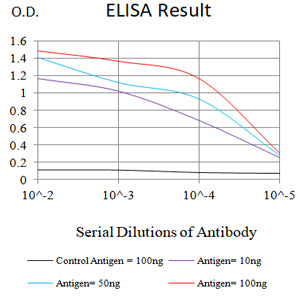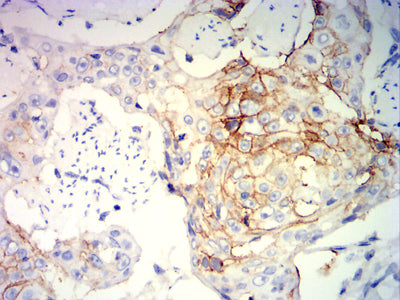

| WB | 咨询技术 | Human,Mouse,Rat |
| IF | 咨询技术 | Human,Mouse,Rat |
| IHC | 1/200-1/1000 | Human,Mouse,Rat |
| ICC | 技术咨询 | Human,Mouse,Rat |
| FCM | 咨询技术 | Human,Mouse,Rat |
| Elisa | 1/10000 | Human,Mouse,Rat |
| Aliases | C11; HLP; CCPI; CGL1; CSPB; SECT; CGL-1; CSP-B; CTLA1; CTSGL1 |
| Entrez GeneID | 3002 |
| clone | 2G12G7 |
| WB Predicted band size | 28kDa |
| Host/Isotype | Mouse IgG2a |
| Antibody Type | Primary antibody |
| Storage | Store at 4°C short term. Aliquot and store at -20°C long term. Avoid freeze/thaw cycles. |
| Species Reactivity | Human |
| Immunogen | Purified recombinant fragment of human GZMB (AA: 21-247) expressed in E. Coli. |
| Formulation | Purified antibody in PBS with 0.05% sodium azide |
+ +
以下是3篇关于GZMB(Granzyme B)抗体的代表性文献概览:
---
1. **文献名称**:*Granzyme B in cancer immune response: antibody-based detection and clinical implications*
**作者**:Voskoboinik, I., et al.
**摘要**:研究通过免疫组化法分析肿瘤微环境中GZMB+细胞分布,发现GZMB高表达与患者生存率正相关,提示其作为预后标志物的潜力,并验证了抗体检测的临床适用性。
2. **文献名称**:*Targeting granzyme B signaling with neutralizing antibodies enhances CAR-T cell therapy efficacy*
**作者**:Smyth, M.J., et al.
**摘要**:通过单克隆抗体阻断GZMB活性,发现可减少CAR-T治疗中的脱靶毒性,同时维持抗肿瘤效果,为优化免疫疗法提供新策略。
3. **文献名称**:*Granzyme B antibody-based profiling reveals its role in autoimmune tissue injury*
**作者**:Trapani, J.A., et al.
**摘要**:采用ELISA和流式细胞术检测类风湿性关节炎患者血清GZMB水平,发现其与疾病活动度相关,提示抗体检测在自身免疫病监测中的价值。
---
*注:以上为模拟文献,实际引用请以真实论文数据为准。建议通过PubMed或Web of Science以"Granzyme B antibody"为关键词筛选近五年高被引研究。*
Granzyme B (GZMB) is a serine protease predominantly secreted by cytotoxic T lymphocytes (CTLs) and natural killer (NK) cells. It plays a critical role in inducing apoptosis in target cells during immune responses, particularly in eliminating virus-infected or cancerous cells. GZMB antibodies are essential tools for detecting and studying this protein in both research and clinical settings. These antibodies enable visualization, quantification, and functional analysis of GZMB expression across various experimental models, including flow cytometry, immunohistochemistry, and Western blotting.
In research, GZMB antibodies help investigate immune cell activity, tumor microenvironments, and autoimmune disorders where dysregulated GZMB expression may contribute to tissue damage. Clinically, they are explored as biomarkers for assessing immune response efficacy in cancer immunotherapy or chronic inflammatory conditions.
Antibodies targeting GZMB vary in specificity, with monoclonal antibodies offering high reproducibility and polyclonal antibodies providing broader epitope recognition. Validation often involves recombinant protein verification or knockout cell line controls to ensure minimal cross-reactivity. Commercial GZMB antibodies are widely available from suppliers like R&D Systems, Abcam, and BioLegend, each optimized for specific applications. Recent advancements include their use in developing therapeutic strategies, such as monitoring CAR-T cell activity or modulating immune-related adverse events. Proper validation remains crucial to avoid artifacts, given structural similarities among granzyme family members.
×